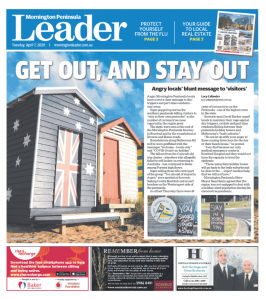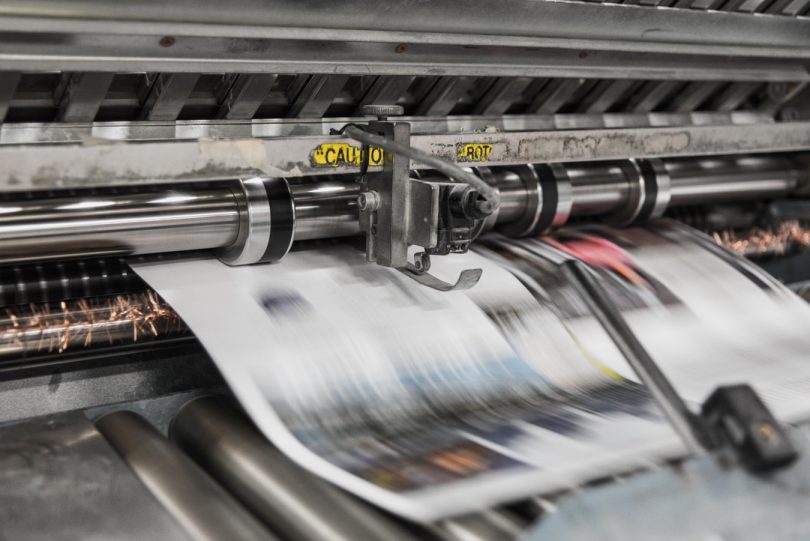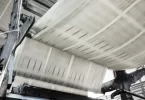The Mornington Leader is among 60 Leader Community newspapers in Victoria which have ceased temporarily printing as a result of CoVID-19, and have placed their news online behind a paywall.
Leader Community news editor in chief Andrew Rennie said the problem is finding a business model that is viable and allows for hyperlocal journalism to continue existing.

The Mornington Leader printed newspaper. (Source Mornington Leader)
“I think that’s the challenge we have, it’s trying to find a business model that allows that type of news to be created,” Rennie said.
The news landscape has changed over the past 10 years, and Rennie said it’s difficult for regional and rural newspapers because there “just isn’t that return that they used to be able to get”.
“The news isn’t free and it never has been free,” he said. It’s paid for in one way or another.
Rennie said the biggest challenge the industry will encounter locally is whether the community is willing to pay for news.
“I think it’s going to continue to be the case and I think until we are in a situation where people put a value on local content, local news, I think it’s going to be hard to find a solution to that problem,” he said.
Rennie said it’s an “education process” to get the community to place a value on what’s produced.
“We do need to try to educate people to change the way they consume their news and the value they place on news,” Rennie said.
Rennie said the Mornington Leader is critical for the community to stay up to date and as a source of information.
“A local paper gives a voice to people who need a voice who otherwise wouldn’t have a voice and national media whether it be print or TV often don’t focus that closely on those types of stories, and so for us to give these people a voice I think is critical,”
“I think that being able to distil information in a way that’s understandable for people is critical as well,” Rennie said.
Rennie said Newscorp print revenue plummeted when businesses across varying industries ceased operating and spending on advertising.
The Mornington Leader had no choice but to temporarily cease printing and move solely to digital on April 9th 2020.

Local newspapers have now resorted to digital as newspapers cease printing. (Source Unsplash)
Moving to digital has provided Newscorp with a “clearer understanding” of their audience.
“Digitally we know absolutely what they read, what they subscribe to, what they spend time on, what they share, what they comment on, all those sorts of things we definitely know,” Rennie said.
The Mornington Leader began in 1953, originally owned by a local businessman until 1973, it was then purchased by Westernport Printing and Publishing, in 1988 and became part of the Leader Group.
The Leader was merged with the Southern Peninsula Gazette in 1995 with the Peninsula added to the name to become the masthead of Mornington Peninsula Leader.
Rennie said the Mornington Leader covers “anything and everything that pertains to the Mornington area” and anything with a broader Melbourne appeal.
The Mornington Leader adopted paywall approach has received a large amount of negative feedback from the local community.
Mornington Peninsula Shire Councillor Antonella Celi said the community shouldn’t have to pay for information relating to important announcements during a pandemic.
“The paywall may be appropriate for your generalised articles, but where there are community, declaration state of emergency or federal state announcements they should not be behind a paywall,” Cr Celi said.

Mornington Peninsula Shire Councillor Antonella Celi is concerned for the elderly having access to important information. (Source Unsplash)
Cr Celi said she is concerned for the elderly and marginalised groups being able to afford to access local information.
“You have those in hardship and marginalised on the peninsula who can’t afford to buy food and petrol, let alone have a computer or go online or pay to go behind the paywall to access information,” Cr Celi said.
Cr Celi said 30 per cent of the Mornington Peninsula community were over 65 and a majority will not have access to online or be able to afford a paywall approach.
“Some pensioners and retirees live week by week, for them to pay is a make or breaker,” Cr Celi said.
However, Rennie said printing to sustain an elderly population was not sustainable from a commercial perspective.
“It’s a very callous way to approach it but if you’re looking at it from a business perspective, whatever money you put into it you have to get a return from a business perspective, elderly may be the casualties in this transformation revolution that we’re going through,” Rennie said.
Cr Celi also said we will see local councils become the main source of information for the community.
A Mornington Peninsula Shire spokesman said they use a number of channels to disseminate information.
The spokesman said they support the diversity of local community news as this adds to the richness of community information, news, comment and discussion.
Local Mornington Peninsula resident Anton Citizen said the Mornington Leader used to be a great newspaper, covering a wide variety of local news but now the local content had “dropped” and the news was filled with stories from surrounding areas.
Mr Citizen said if the Mornington Leader focused more on local stories and attracted local business, they wouldn’t need a paywall approach.
Mornington Peninsula News spokesman said The Mornington Leader was technically their competition but they acknowledge that the ceased printing is disappointing for all those involved and have great respect for all the “hard-working” journalists.
“Mornington Peninsula News Group will double-down on our efforts to keep locals informed in their absence,” the spokesperson said.
Recently the Australian government is moving to enforce both Facebook and Google to start paying for news content.
“The government needs to make sure that people who create content have the ability to control that content,” Rennie said.
Rennie said both Facebook and Google have had a “huge impact on their business” over the past 15 years.
However, Rennie said Newscorp also understands that social media are an important distribution platform and allow for them to connect with their audience.
Rennie said we will see the traditional news structure change with printed delivery ceasing and “bulk pick up points” being offered.







